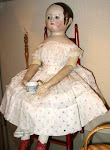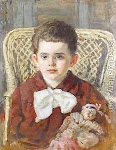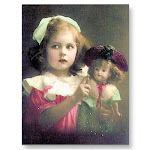 Girls didn't have the same education as boys. They learned to become good wives and good mothers. This education was very unfair so in 1870, the Education Act was passed. It offered schools for all children between the age of 5 and 13.
Girls didn't have the same education as boys. They learned to become good wives and good mothers. This education was very unfair so in 1870, the Education Act was passed. It offered schools for all children between the age of 5 and 13.

 " Upstairs" Middle class girls posing with their dolls late 19th century
" Upstairs" Middle class girls posing with their dolls late 19th century
< " The Lesson" Notice small Motschmann doll taking center place between the lesser dolls on the parlour chair.
" The Lesson" Notice small Motschmann doll taking center place between the lesser dolls on the parlour chair.
Parents of rich children often were bankers, merchants, industrials or civil servants. They lived in beautiful suburbs, sometimes in private hotels. The upper class organized parties and could go to festivals.
 " The Lesson" Notice small Motschmann doll taking center place between the lesser dolls on the parlour chair.
" The Lesson" Notice small Motschmann doll taking center place between the lesser dolls on the parlour chair. Only children from rich families went to school, but these were not many. Boys went to famous schools like Eton where education was very strict.
Only children from rich families went to school, but these were not many. Boys went to famous schools like Eton where education was very strict.
 A Victorian Upper Middle Class Parlour
A Victorian Upper Middle Class Parlour

Victorian Child holding a Motschman Taufling Doll. This lucky child 's family must have been very wealthy to afford such toys.
 Very solemn Victorian children posing for portrait
Very solemn Victorian children posing for portrait
 Child holding a Wax over Composition 'Pumpkin Head Doll"
Child holding a Wax over Composition 'Pumpkin Head Doll"
 William Powell Frith, Many Happy Returns of the Day (1856) This painting portrays a wealthy family coming together in their living room to celebrate the birthday of their youngest daughter. A typical domestic scene of Victorian upper class.
William Powell Frith, Many Happy Returns of the Day (1856) This painting portrays a wealthy family coming together in their living room to celebrate the birthday of their youngest daughter. A typical domestic scene of Victorian upper class.
 Young ladies were constantly chaperoned. If a lady was to be found alone with a gentleman who was other than family, her reputation would be ruined. And her gentleman companion would find himself the object of gossip, and most usually derision.
Young ladies were constantly chaperoned. If a lady was to be found alone with a gentleman who was other than family, her reputation would be ruined. And her gentleman companion would find himself the object of gossip, and most usually derision. 
Courtship was considered more a career move than a romantic interlude for young men, as all of a woman's property reverted to him upon marriage. Therefore courting was taken very seriously--by both sides. Men and women were careful not to lead the other on unnecessarily.

Members of Victorian society kept busy with parties, dances, visits, dressmakers, and tailors. Keeping track of what other people in your social class were doing was also a full-time occupation.
The Lower Middle Class
The lower middle class consisted of small shopkeepers and clerical workers. To work, they needed to be literate, but higher education was not necessary. Their children were kept in school until the age of twelve or fourteen, whereupon they worked in the family shop, or in some other suitable occupation.
 Bobber and Kibs
Bobber and Kibs
 "Victorian middle class children;" Almost all of the little girls in pinafores. Notice that all of the girls, even the younger ones are wearing hats. It would be an impropriety for them not too, children weren't exempt from social politeness in those days.
"Victorian middle class children;" Almost all of the little girls in pinafores. Notice that all of the girls, even the younger ones are wearing hats. It would be an impropriety for them not too, children weren't exempt from social politeness in those days.
 Typical Wooden Peg Doll from the Grodner Tal region in Germany. These tiny inexpensive dolls were commonplace toys for Victorian children.
Typical Wooden Peg Doll from the Grodner Tal region in Germany. These tiny inexpensive dolls were commonplace toys for Victorian children.
 "Cherry Ripe"(c.1879 Private Collection), Millais
"Cherry Ripe"(c.1879 Private Collection), MillaisAs London started to become a world center of business and finance, the white collar world grew enormously, now including clerks, middle managers, bookkeepers, and lower-level government workers. They valued hard work, sexual morality, and individual responsibility. Their education became increasingly important and sons who were not sent off to elite boarding schools, had the chance to go to local grammar schools, or they went to private schools with set curriculums.
From "A Lark Rise to Candleford"
Other virtues included sobriety, thrift, ambition, punctuality, and constructive use of their leisured time.
Downstairs
 Being a servant in one of the grand Victorian houses was a position which would guarantee shelter and food. However, there was etiquette to be learned.
Being a servant in one of the grand Victorian houses was a position which would guarantee shelter and food. However, there was etiquette to be learned.

Using the proper title was of the utmost importance. "Ma'am" or "Sir" was always appropriate. If "Ma'am" was seen, it was necessary that you 'disappear', turning to face the wall and avoiding eye contact.
 Life was easier, though, amidst your fellow servants. Although private fraternization was frowned upon, it wasn't against the rules for those 'below stairs' to enjoy singing, dancing, and other social activities together.
Life was easier, though, amidst your fellow servants. Although private fraternization was frowned upon, it wasn't against the rules for those 'below stairs' to enjoy singing, dancing, and other social activities together.

The middle classes were predominantly churchgoing and most professional classes attended the Church of England. The idealization of family life and togetherness were characteristic of the middle class because they had the opportunity to be together. The working class sent their children to work at a fairly young age, and upper class children were raised by servants and saw little of their parents.
A man's status depended mostly on his occupation and the family he was born into. A married woman's status came from her husband. Middle class men did not marry until the age of 27 or 30 because of the importance of being financially stable.
Downstairs
 Being a servant in one of the grand Victorian houses was a position which would guarantee shelter and food. However, there was etiquette to be learned.
Being a servant in one of the grand Victorian houses was a position which would guarantee shelter and food. However, there was etiquette to be learned.

Using the proper title was of the utmost importance. "Ma'am" or "Sir" was always appropriate. If "Ma'am" was seen, it was necessary that you 'disappear', turning to face the wall and avoiding eye contact.
Paintings of young girls in "mob caps" prevailed during the 1880's as it was fashionable to wear bonnets or caps in C18 style.
The upper class was never to be addressed unless it was absolutely necessary. If that was the case, as few words as possible were to be uttered.
 Life was easier, though, amidst your fellow servants. Although private fraternization was frowned upon, it wasn't against the rules for those 'below stairs' to enjoy singing, dancing, and other social activities together.
Life was easier, though, amidst your fellow servants. Although private fraternization was frowned upon, it wasn't against the rules for those 'below stairs' to enjoy singing, dancing, and other social activities together.

The middle classes were predominantly churchgoing and most professional classes attended the Church of England. The idealization of family life and togetherness were characteristic of the middle class because they had the opportunity to be together. The working class sent their children to work at a fairly young age, and upper class children were raised by servants and saw little of their parents.
A man's status depended mostly on his occupation and the family he was born into. A married woman's status came from her husband. Middle class men did not marry until the age of 27 or 30 because of the importance of being financially stable.













































.jpg)
























































































What fantastic images you find. Not sure how typical Frith was as he had a mistress/ family not far away. It should be said education was generally very restrictive for even upper class boys with most of it around the classics. Middle class girls were supposed to be trained to be good wives - but some escaped and eg. the suffragettes believed in female education.
ReplyDeleteThank you for the added information! You are so right about the suffragettes. I love any feedback you can give me on the subject, it facinates me.
ReplyDeleteThank you for your comment
Bisous
Marta
Marta, reading your post is like reading a fabulous book! Gracias my friend :)
ReplyDeleteCada vez que doy lectura a tus post recreo un pedazo de la historia fascinante en textos e imágenes.
ReplyDeleteMuchas gracias por la dedicación y el compartir.
Un abrazo!!!!
Judy, Maria Cristina..Thank you so much! Nothing pleases me more than to make these posts interesting to my friends.
ReplyDeleteYou are too kind in your compliments.
Bisous
Marta
Marta is a great emotion, every time, see your materials. Among other things, a lot of interesting points and ideas (groped) play miniatures :-)
ReplyDeleteThe trolley with the pins you can try!
The background music makes it all so true ... And I, who I'm Victorian soul, I find myself at home :-)
Thanks again, hugs (we are two girls and our reputation will not be affected!)
Flora :-)
Thank you Flora, you are so funny!
ReplyDeleteGlad you can use some of this information for your wonderful work.
Bisous
Marta
Hi Marta, What beautiful images you had posted with great information. Thank You for stopping by today. Have a great 4TH....Julian
ReplyDeleteHi Marta, I always look forward to reading your lovely & informative posts. Karen
ReplyDeleteThank you Karen...Its great to hear from you!
ReplyDeleteHave a lovely Summer my friend.
Hugs
Marta
Hello Dear Marta.
ReplyDeleteSiempre te digo lo mismo. Pero es que tus posts son fascinantes. Me encanta toda tu información sobre la sociedad en la historia de esta época. Es curioso ver como las costumbres han cambiado. Como son hoy en día y como seran en el futuro? toda esa información... me fascina.
Siento no ser más puntual con tus posts, por que disfruto mucho con ellos. No merezco tu fidelidad.
¡Ah! Me encanta esa victorian kitchen.
Besos.
Gracias Alberto,
ReplyDeleteNo sabes como agradezco tus comentarios. Yo se lo envuelto que estas con los galgos y esa noble causa.
No te preocupes si no puedes visitarme a menudo, yo comprendo muy bien.
Muchos besitos